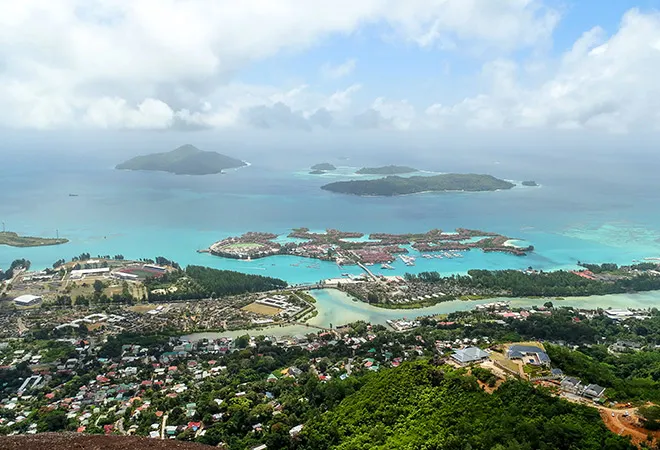-
CENTRES
Progammes & Centres
Location

Seychelles’ current and future prosperity is intrinsically linked to its marine and coastal assets. Fisheries and tourism are the two principle sectors which drives Seychelles’ economy, GDP, and creates employment. Incommensurate with its minute population and limited resources, Seychelles has acquired a voice in international affairs and in the field of ocean governance is now recognised as a major facilitator and advocate for maritime security and the sustainable development of the oceans.
Despite its small size, whether measured in terms of its population, landmass, GDP, or the size of its diplomatic service, Seychelles has achieved a significant reputation as a noticeable player within the world of diplomacy and global governance. Two examples indicates this role.
In 2015, for a period of two years, Seychelles assumed the role of chairpersonship of one of the most vital maritime security governance organisation: the Contact Group on Piracy off the Coast of Somalia (CGPCS) operating in the Western Indian Ocean region in which many countries coordinates their maritime security work, such as capacity building, naval operations, and information sharing. This was the first time the international community placed its trust on a regional country to undertake this major responsibility.
Seychelles is also credited for advocating the concept of blue economy. In January 2018, it launched the Blue Economy Strategic Framework, which articulates Seychelles ‘Blue Economy Brand’ as a unique comparative advantage, based on its sustainability credentials. Initiatives such as debt for marine swap which seeks to forgive part of Seychelles national debt in exchange for strictly protecting 30% of the EEZ to support climate adaptation, and Marine Spatial Planning initiative for re-organising Seychellois waters, have gained appreciation from the international community.
But despite these two success stories, given such limited human and financial resources, how has Seychelles emerged as an agenda setter in ocean governance? What explains its success story? Four paradigms explains Seychelles’ success.
Unique geostrategic location: If one is to evaluate a country’s capability in-terms of its material resources such as land, money, people, and energy resources, then Seychelles would fare poorly. However, the archipelagic state is endowed with another valuable capability: its geostrategic position. Located at the center of the Western Indian Ocean, Seychelles’ ports in Victoria and Mahe, have been important nodes for international blue water navies for operational turnaround, replenishment at sea, and conducting anti-piracy patrols. Seychelles has been able to use its physical location as a diplomatic tool, especially since the outbreak of Somali-based piracy from 2008 that brought Seychelles back on to the geopolitical map. Seychelles has successfully in amassed significant support and investments from the international community in its fight against piracy.
But with successful anti-piracy campaigns, navies faced the challenge of what to do with the arrested piracy suspects. Many countries lacked the will to prosecute pirates due to the operational costs it would imply. Seychelles declared its willingness to engage in piracy prosecution and soon became the main prosecuting state, due to help from The United Nations Office on Drugs and Crime and EUCAP Nestor, two main capacity building programme in criminal justice sector. Also, countries like India, UAE, US, Denmark and others donated maritime surveillance patrol vessels, boats, and reconnaissance aircrafts to assist the Seychelles Coast Guard.
Seychelles ocean diplomacy: Apart from maritime security, Seychelles has successfully built considerable expertise in ocean affairs and has worked on a blue economy campaign, making it the core concept around which it organises its foreign (ocean) policy. Seychelles’ blue economy has developed an integrated approach to ocean-based sustainable development that brings together the three pillars of sustainability: economic, environmental, and social. This is informally known under corporate sustainability as ‘people, planet, and profits’. Seychelles has launched world’s first Blue Bond, raising US $15 million from international investors.
From 2011 onwards, Seychelles’ Ministry of Foreign Affairs has worked to advance a blue economy campaign. A series of presentation were given at various events like: African Union Summits, at a meeting on African Integrated Maritime Strategy (2013), IORA Economic and Business Conference (2013), Abu Dhabi Sustainability Week (2014) etc. Also, the University of Seychelles launched a Blue Economy Research Institute — James Michel Blue Economy Research Institute — in March, 2014. Seychelles President Danny Faure has also been conferred the “Blue Economy Award” which recognises Seychelles as a champion of the blue economy in the maritime sector, across the African continent and around the world. As an outcome of Seychelles agenda-setting work, the blue economy was included as a core concept in the African Union’s AIMS 2050 Strategy.
Political culture: A country’s diplomacy depends not just on resources and skills, but also on its people and is thus shaped by culture, history, and experience. Seychelles does not have an indigenous culture or population. Its population includes an amalgamation of descendants of French, African, British settlers, as well as African, Indian, Chinese, and Middle Eastern traders. There is a genuine openness to and appreciation of differences. This mixture of cultures, without a strong devotion to any one of them makes the Seychelles adept at what has come to be known as “Creole diplomacy” as espoused by Christian Bueger and Anders Wivel. Pragmatism and openness towards all sorts of cultures and nations is how Creole culture works.
Political strategy: As a small state occupying a unique geostrategic location, while Seychelles is vulnerable to great-power meddling, it has been successful in turning its location into a strength. By using its location as a starting point, Seychelles has presented itself as a legitimate actor with regard to blue economy and anti-piracy. By adhering to its principle of openness and not favoring the interests of one partner above another, Seychelles has been able to leverage support for wide-ranging maritime security initiatives.
This hedging strategy has been quite successful and has received support from all major powers active in the region without becoming reliant on any single one of them. The Seychellois government continues to cooperate with a diverse range of nations and organisations on maritime issues. It is an active member of multiple international organisations in the region like IORA, COMESA, SADC, AU, and Indian Ocean Commission. This multi-membership position allows Seychelles to act as a knowledge broker and translate between discussions in these multilateral settings.
Limitations: Although Seychelles success has been remarkable, there are certain limitations as well. One limitation is small administrative capacity. With a diplomatic staff of just around one hundred people, sometimes it becomes difficult to partake in all negotiations. However, while its small governmental capacity and small size of its foreign service might be interpreted as weakness, they can also be understood as strengths. With the ministries in close proximity and staff moving regularly between ministries, it becomes easier to coordinate between ministries and establish effective means of communication. Administrative and bureaucratic hurdles can be avoided. This is of particular importance when it comes to addressing cross-cutting issues like sustainable development, maritime security, alleviating poverty or the blue economy.
The diplomatic work of Seychelles is indeed a surprising success story. With a large number of island economies reliant on ocean resources, there has been an international debate on how to utilise these resources in a sustainable way for the benefit of mankind. It is here where Seychelles with all the expertise it has gained knowledge, made technological advancements, and has assumed a leadership role.
Seychelles’ diplomatic work clearly shows how and why factors such as a country’s location, expertise, culture, and smart strategies make a major difference. Seychelles is now an important and reliable partner of the international community. By acting as an innovator and experimenting with new ways of thinking, Seychelles has maximised its influence in the international debate on ocean governance and has successfully championed Africa’s blue economy agenda.
The views expressed above belong to the author(s). ORF research and analyses now available on Telegram! Click here to access our curated content — blogs, longforms and interviews.

Abhishek Mishra is an Associate Fellow with the Manohar Parrikar Institute for Defence Studies and Analysis (MP-IDSA). His research focuses on India and China’s engagement ...
Read More +